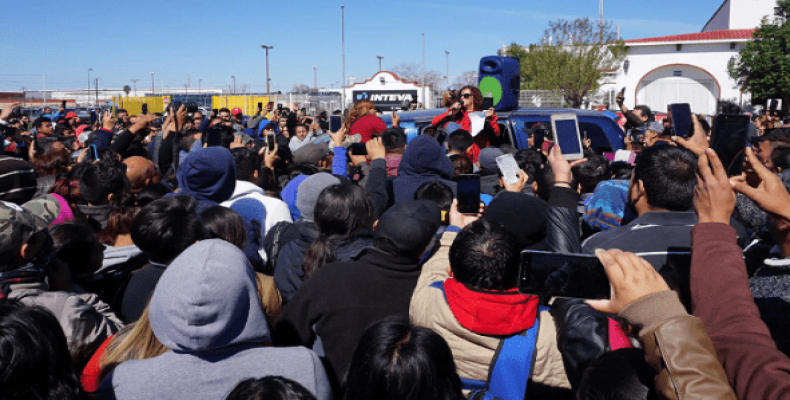Mexico City, February 20 (RHC)-- In Mexico, after 45 unionized factories won a 20% wage increase last week, other workers continue with confidence to demand the same in Mexico's factory-laden Matamoros. Strikes in Matamoros continue as employees at the world’s second largest Coca-Cola bottling plant demand higher wages, better bargaining rights and a one-time bonus.
“We’re not fighting for ourselves, but for a better quality of life for our kids and their children. They won’t be screwed over or trampled upon by these kinds of people any more,” Juan Luis Gaytan, a plant mechanic told The Guardian.
Around 500 workers at the Arca Continental-operated factory in the northern city of Matamoros that borders Brownsville, Texas in the United States joined forces demanding that company executives award employees a 20 percent pay raise and a 32,000-peso bonus, known as the ‘20/32’, among other concessions. Those on strike at the unionized plant have cause to keep demanding the 20/32.
On February 9, 48 unionized maquiladoras, large-scale factories that have sprung up across Mexico’s northern border since the 1980s, announced the end of their 25,000 person, two-week strike in Matamoros after companies agreed to the 20/32 for “unionized workers.”
Workers say they are also going after a 40-hour work week and a reduction in union fees from four to one percent because the main factory syndicate, Union of Laborers and Industrial Workers of the Maquiladora Industry (SJOIIM), they say, does little to protect their rights or bargain on their behalf.
“The union has always had us by the throat,” Heriberto Lomas, told The Guardian as he participated in the wildcat strike outside of Arca Continental. “Everyone is scared they’ll be fired. That’s why they haven’t gone on strike before,” added Lomas.
The SJOIIM leaders are widely disliked for excluding workers from having their voices heard by management and for allegedly taking company kickbacks in exchange for pacifying workers and not bringing their demands to the table. According to the Wall Street Journal 90 percent of all maquiladora final labor contracts are never seen by employees. Maquiladoras are factories where items are assembled for export.
Labor lawyer Susana Prieto Terrazas from Ciudad Juarez told the strikers in January: “Fellow workers, you have to pressure, for starters, your union.”
International media is saying that the impetus for the strikes, which have spread to non-unionized Wal-Mart stores in Matamoros as well as other northern border cities with heavy maquiladora presence -- namely, Reynosa and Ciudad Victoria -- was President Andres Manuel Lopez Obrador’s (AMLO) post-inaugural December announcement to double the minimum wage in the region.
AMLO’s salary increase triggered a contract clause that requires a pay raise as the minimum wage goes up. The 400 Coca-Cola workers in Matamoros in northern Mexico are on strike. Yesterday thugs for the multinational closed access points and held 100 workers against their will.
hose on strike in Matamoros which depends on cheap labor migrating from other parts of Mexico are finding themselves at risk of losing their jobs. "In the past week, as many as 2,000 strike leaders have been fired and blacklisted, despite legal prohibitions and non-reprisal agreements signed by the employers," a U.S. union delegation comprising the AFL-CIO, United Auto Workers and United Steelworkers.
Juan Pablo Castañon, president of the Business Coordinating Council (CCE), said the walkouts were “illegal” and unjustified.
“The invitation to stage strikes in other cities in the same way concerns us. The obligation of labor authorities should always be harmony and labor peace and that means that ... reasoning [is needed] from social leaders who are inciting these illegal strikes,” claimed Castañon Feb. 15.
One small-scale factory owner, Abdio Lorenzo, who himself moved to Matamoros 20 years ago from Veracruz said of the labor boycotts: “People aren’t listening to their labor leaders any longer. It’s become a social movement.”
Thousands strike at Mexican factories to demand higher wages and better conditions

Related Articles
Commentaries
MAKE A COMMENT
All fields requiredMore Views
- U.S. healthcare cuts spark nationwide protests
- Cuba defends Africa-America shared future at UN Tourism Summit
- Cuban foreign minister arrives in Honduras for CELAC Summit
- Massive anti-Trump protests take to the streets across the United States
- IX CELAC Summit concludes with the signing of the Tegucigalpa Declaration

